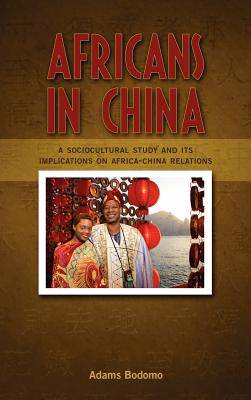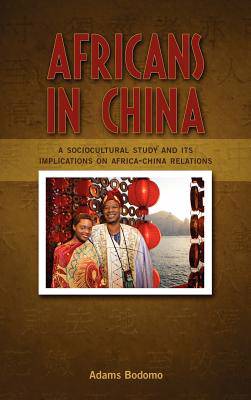
- Retrait gratuit dans votre magasin Club
- 7.000.000 titres dans notre catalogue
- Payer en toute sécurité
- Toujours un magasin près de chez vous
- Retrait gratuit dans votre magasin Club
- 7.000.0000 titres dans notre catalogue
- Payer en toute sécurité
- Toujours un magasin près de chez vous
Africans in China
A Sociocultural Study and Its Implications on Africa-China Relations
Adams Bodomo
Livre relié | Anglais
95,45 €
+ 190 points
Description
While there is much discussion on Africa-China relations, the focus tends to lean more on the Chinese presence in Africa than on the African presence in China. There are numerous studies on the former but, with the exception of a few articles on the presence of African traders and students in China, little is known of the latter, even though an increasing number of Africans are visiting and settling in China and forming migrant communities there. This is a phenomenon that has never happened before the turn of the century and has thus led to what is often termed Africa's newest Diaspora. This book focuses on analyzing this new Diaspora, addressing the crucial question: What is it like to be an African in China? Africans in China is the first book-length study of the process of Africans travelling to China and forming communities there. Based on innovative intermingling of qualitative and quantitative research methods involving prolonged interaction with approximately 800 Africans across six main Chinese cities--Guangzhou, Yiwu, Shanghai, Beijing, Hong Kong and Macau--sociolinguistic and sociocultural profiles are constructed to depict the everyday life of Africans in China. The study provides insights into understanding issues such as why Africans go to China, what they do there, how they communicate with their Chinese hosts, what opportunities and problems they encounter in their China sojourn, and how they are received by the Chinese state. Beyond these methodological and empirical contributions, the book also makes a theoretical contribution by proposing a crosscultural bridge theory of migrant-indigene relations, arguing that Africans in China act as sociopolitical, socioeconomic, and sociocultural bridges linking Africa to China. This approach to the analysis of Diaspora communities has consequences for crosscultural and crosslinguistic studies in an era of globalization. Africans in China is an important book for African Studies, Asian Studies, Africa-China relations studies, linguistics, anthropology, sociology, international studies, and migration and Diaspora studies in an era of globalization.
Spécifications
Parties prenantes
- Auteur(s) :
- Editeur:
Contenu
- Nombre de pages :
- 300
- Langue:
- Anglais
Caractéristiques
- EAN:
- 9781604977905
- Date de parution :
- 18-05-12
- Format:
- Livre relié
- Format numérique:
- Genaaid
- Dimensions :
- 152 mm x 229 mm
- Poids :
- 607 g

Les avis
Nous publions uniquement les avis qui respectent les conditions requises. Consultez nos conditions pour les avis.






